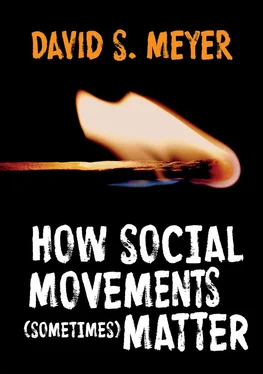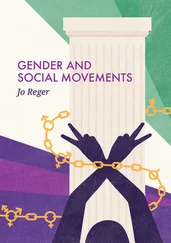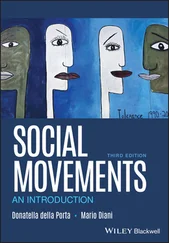Social movements of all kinds and sizes campaign for an extremely diverse array of goals: against hikes in university tuition, austere budget policies, taxes, corruption, immigration, and carbon emissions – to name only a few recent issues. In much of the world, social movements have grown into a virtually permanent presence in mainstream politics, often supported by state subsidies or tax preferences. National and transnational groups concerned with the environment or human rights advocate for their visions of justice, sometimes engaging in mass politics.
These are only a sampling of relatively recent examples of mass movements attempting to step into the political fray, redress wrongs, and change the world. When you read this, you will be able to find stories of even more recent protests and campaigns that are just as odd, interesting, appalling, or inspiring. There’s an excitement and a romance associated with regular people trying to step into history and change the world, but do their efforts matter? Would people turn out to protest if they thought they couldn’t make a difference?
Sometimes, they do.
We tell stories about movements that seem to play a critical role in affecting change. Gandhi’s Salt March is part of the Indian Independence movement’s success story. Similarly, Lech Walesa’s leadership of the Solidarity movement in Poland during the Cold War is seen as a critical factor in the end of Communism, democratization of Poland, and the end of the Soviet Union. In the United States, schoolchildren learn to celebrate historic protest moments, including the Boston Tea Party and the 1963 March on Washington, and their impact on making the United States what it became. But those histories often pull the moments out of the context of the larger movements of which they were a part.
Politicians and political activists certainly act as if social movements might matter, and scholars have been trying, for the better part of at least four decades, to figure out why, when, and how. Although we know more than we did previously, discussions about the origins and influences of social movements frequently retreat into competitive assertions about what mattered and what was irrelevant. Obviously, people who talk about social movements in general, and even more so, about particular social movements, often have a strong stake in valorizing or vilifying them. People often react to movements by creating heroes or villains. And the question of potential effectiveness is generally the most important criterion in evaluating a movement. Courageous heroes broker sacrifices that could lead to political influence; misguided misanthropes act out when it doesn’t matter.
Our histories show that protests can matter a great deal, but not by themselves, and often not in ways activists intend. When King George III learned that colonists had dressed as Indians to throw discounted tea into the Boston Harbor, one of many acts of resistance, he saw his empire unraveling and responded harshly. Repression spurred further protests – and ultimately, America. It wasn’t the Tea Party by itself that made the American revolution successful; rather, the events one night at Boston Harbor were part of a much longer, larger, and more complicated process that included other protests, armed conflict, speeches and pamphlets, and more mainstream politics in the colonies and England. Although throwing crates of tea off a ship makes for a dramatic story, it is only by putting that protest in a larger context that we can understand how movements really matter.
In this book, we’ll see how protest movements sometimes work to influence politics, policy, and culture, and show how a protest in the streets can translate into something more than an afternoon’s entertainment. We will also see the numerous contingencies involved in movement politics, as well as the necessities of alliances within government and mainstream politics.
It’s crucial to understand that protests can best be understood as part of a larger social and political process, and that mainstream politics provides obstacles for organizers to navigate and tools that they can use to increase their influence in a variety of ways. Social protests change the world, but they can’t do it by themselves; they depend upon mobilizing others to act on their behalf, and activists have little control over the ultimate outcomes of their efforts.
Here’s the argument: When people protest, they tell authorities that they’re unhappy about something and, often implicitly, threaten to do more than protest: vote, contribute money, lobby, set up a picket, blockade a road, or try to blow up a building, in hopes of getting what they want. Opponents and allies in government make judgments about how strong and widely held demonstrators’ grievances are, and respond, sometimes with concessions and reforms, sometimes with harsh repression, and sometimes with a mix of both. Social movement activists react to those responses, often starting a chain of events that produces something far different than anyone initially imagines.
We make a mistake when we imagine the outcomes of a social movement to be determined solely by the battle between organized activists and their opponents, focusing exclusively on the moral passion, organization, or tactics of the movement. It’s critical to examine social movement activism in a larger context that includes more conventional political efforts that activists provoke or encourage.
Demonstrators can stiffen the spine of would-be allies in government, suggesting there might be advantages in pressing for new positions on climate change, abortion, or gay marriage. (Politicians and other leaders often use social movements to “force” them to do what they want anyway.) No savvy politician will admit to changing direction in response to demonstrations in the street, but of course, it happens all the time.
When activists make progress, it’s always less than what they want. The antiwar movement in the Vietnam era ultimately ended the draft, but the war dragged on. Immigrant rights and anti-immigration demonstrators stopped their opponents in 2005, battling to a stalemate that frustrated everyone. (Across Europe, advocates of immigration rights and opponents of immigration have mobilized, linking with allies in government to both welcome and to prohibit new immigrants.) People don’t generally take to the streets looking for smaller reforms, but often it’s only by asking for more that they get anything at all.
Social movements work through a variety of means, changing the lives and values of those who participate in them, establishing or altering organizations that coordinate them, effecting policy reforms, and influencing norms and culture. Demonstrators also signal to other citizens who might share their views that they are not alone, that things could be otherwise, and that they might be able to do something about it. The large national event that receives coverage in the national papers reflects hundreds of smaller, less-visible actions and meetings in church basements and living rooms around the country, as people develop the temerity to think they can change the world. Sometimes they can.
Here’s what’s coming:
In chapter 1, we’ll explore why movements emerge in the first place. Although saints and psychopaths may be so committed to a cause that they’re ready to protest all the time, most people are concerned with the day-to-day business of managing their lives, their work, family, and friendships. Although activists are always trying to promote mobilization on the issues they care about, they only succeed sometimes, by convincing others that protest is possible, necessary, and potentially effective. Because large and powerful movements aren’t a constant presence in most societies, we can’t understand what works unless we make sense of why those movements only appear sometimes. In fact, the factors that invite or provoke movements also promote social change. Unlike the foolproof recipes offered in a cookbook, the success of different strategic and tactical recipes for action depends upon the context in which they’re deployed.
Читать дальше












